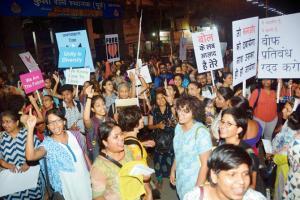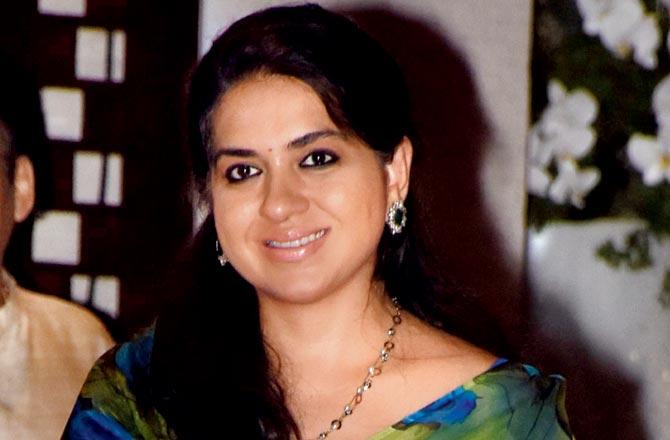With a new government slated to be elected by May 23, India's women are taking to the streets to demand a leadership that finally pays attention to half its electorate

Protesters participate in the Women March For Change event in Kurla on Thursday. Pic/Sayyed Sameer Abedi
Social activist Shabnam Hashmi feels part vindicated, part surprised, when she tells us of the numbers of women who spilled on to the streets of Delhi on Thursday afternoon. The former, because Hashmi was aware of the growing anger against the ruling government for having undermined the "hard-won freedom" of women over the last five years. What she hadn't seen coming was the massive turnout — over 40,000 women participated in Delhi, with 150-odd rallies across the country on the same day — as part of the Women March For Change campaign. The planning, she says, was done at short notice — March 22, to be specific — and mainly through social media platforms. "The fact that it picked up so soon is a strong indication that women are disappointed," she says. "What it has also done is break the atmosphere of fear."
Hashmi clarifies that she has no affiliation with any party. "I have fought against the Congress-ruled UPA, too. In fact, in 2004, we were arrested for a demonstration inside the Parliament to demand the repeal of the controversial Prevention of Terrorism Act [POTA]." But the difference between this government and those of the past, she says, is that this one is fascist and intolerant. This sentiment might not be one that is shared by all women in the country. But the fact that women form a significant 48.13 per cent of the electorate, with nearly 4.35 crore first-time voter registrations, as compared to 3.8 crore male voters, means their voices will matter, now more than ever.
ADVERTISEMENT

Shaina NC
Why demand change?
The Spoilt Modern Indian Woman (SMIW), a feminist group on Facebook with over 53K followers, has been at the receiving end, ever since it started posting stories that questioned the BJP government. "We have been critiquing government policies since as far back as Feb 2016, when the JNU incident happened. At the time, we got responses saying that 'you need to stick to talking about women's rights'. But feminism is a political movement," says its co-founder, who goes by the pseudonym Bruce Vain. Bruce, along with activist Sonam Mittal started the page in 2015.
With most states going to polls this month, the founders have amped up their attacks. Recently, SMIW put out a post asking followers to share "how the current government has let women of India down in the last five years". One user cited the poor show of the Beti Bachao Beti Padhao campaign; 56 per cent of the funds were spent only on publicity, the user claimed, citing news reports. Another woman highlighted the drop in female participation in the workforce — the Centre for Monitoring Indian Economy (CMIE) reported that 2.4 million women were lost from the labour force within the first four months of 2017. While a few others pointed out discrimination against women (BJP's stand on Sabarimala). There were some voices, though insignificant, which lauded the government — one woman was glad that maternity leave had increased. "If you go back to the BJP's 2014 manifesto, most promises have not been delivered. As citizens, as women, it's important to speak about how inefficient the government has been. We need to assert our rights," say Mittal and gender activist Sumbul Mashhadi, who recently joined SMIW.

Kamayani Bali Mahabal
RTI activist Anjali Bhardwaj, whose group Satark Nagrik Sangathan, supported the rally in Delhi, says the "march was to claim constitutional rights for women". "Things were never hunky-dory, but in the last five years, there has been a huge onslaught on issues that concern women. There is a growing sense of insecurity and fear." She points out to the statement released by those supporting the march, which claimed that the "bogey of 'love Jihad', Romeo Squads, Khap panchayat diktats and the vicious trolling of women who dare to speak their mind — are all direct attacks on women's right to choose, to curb their agency with threats
and violence".
Human rights activist Kamayani Bali Mahabal, who participated in the march from Amritsar, says the fact that the government deferred its decision on the Women's Reservation Bill means that women are not priority. "The march was a message for all political parties, especially the current government, for whom cows are more important than women," Mahabal says, while referring to how the government had wanted to ban the life-saving hormone, oxytocin, used during pregnancies to prevent excessive bleeding. The BJP's line of argument was that oxytocin was used to over-milk cows.
Need more representation
BJP spokesperson Shaina NC blames the current wave of distrust on the poor representation of women in legislation. "For women's issues to be raised, you need more women in Parliament. The reality is that we do not even have 11.3 per cent women as Members of Parliament. If we look at assemblies, it is not even 9 per cent. Every political party needs to ensure more women are given tickets, so that they can represent the larger mass of the electorate, which is nearly 50 per cent of us."
Her views are echoed by Bengaluru-based IT professional Tara Krishnaswamy, who co-founded Shakti, a non-partisan pan-India citizen's collective, which campaigns for equal representation of women in legislation. "[In the 1940s] the women on the Constituent Assembly of India [elected to write the Constitution of India], had rejected reservation, claiming that we do not need any special accommodation because we are a democracy. But, over time it has become clearer, that democracy, if anything, is not a great leveller.
The patriarchal norms are over-riding to the point that makes it impossible for women to find representation, because parties simply won't give them a ticket," says Krishnaswamy. Hailing awareness rallies that are being spearheaded by women, she adds, "Politics is an extremely testosterone-driven animal in India. Women need to come out in larger numbers and assert themselves politically, because it is difficult for women in political parties to fight this fight entirely on their own."
Only earlier this week, Shaina said she would champion the cause of reservation "even if I have to fight the male chauvinistic mindset in my party and all other parties".
She added that other than Mamata Banerjee, who has given 41 per cent and Naveen Patnaik, who has given 33 per cent to women candidates, all other parties only paid lip service to the women's cause.
Shaina, however, says that the BJP government is working towards addressing issues of women's safety, education, and how to empower women. "Beti Bachao, Beti Padhao is not just a tag-line. Through the Ujjwala Yojana, we have tried to combat health hazards by ensuring that everyone gets a gas cylinder, and we are ensuring ease in getting bank loans. But yes, one has to change the mindset in public life and polity, and that cannot happen until there is enough representation."
4.35cr
The no. of first-time women voters in 2019, compared to 3.8 crore first-time male voters
Catch up on all the latest Mumbai news, crime news, current affairs, and also a complete guide on Mumbai from food to things to do and events across the city here. Also download the new mid-day Android and iOS apps to get latest updates
 Subscribe today by clicking the link and stay updated with the latest news!" Click here!
Subscribe today by clicking the link and stay updated with the latest news!" Click here!







